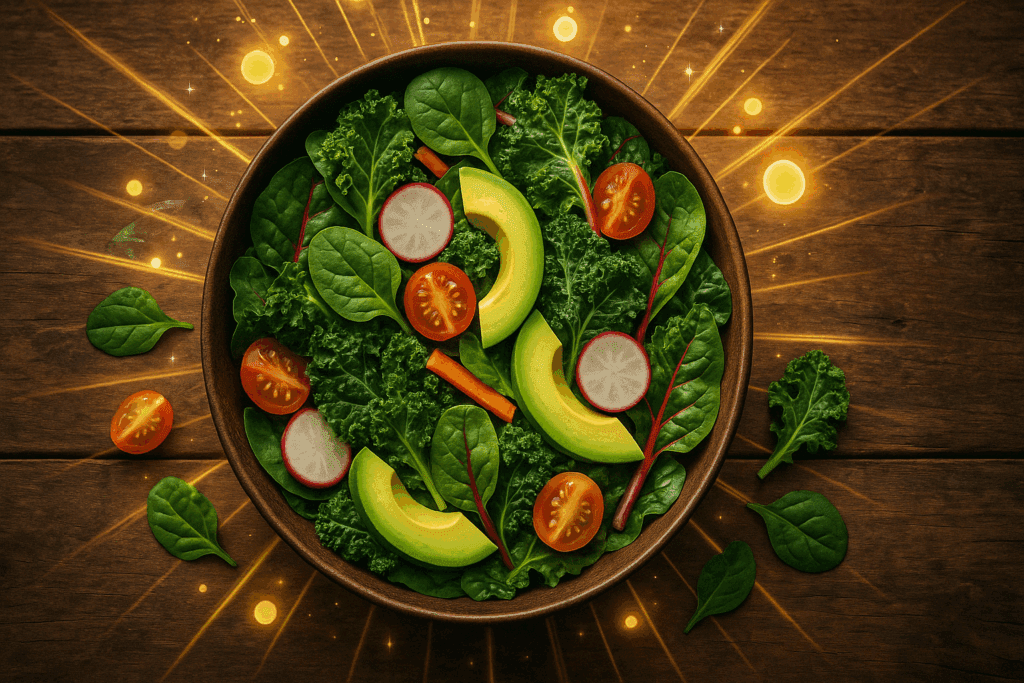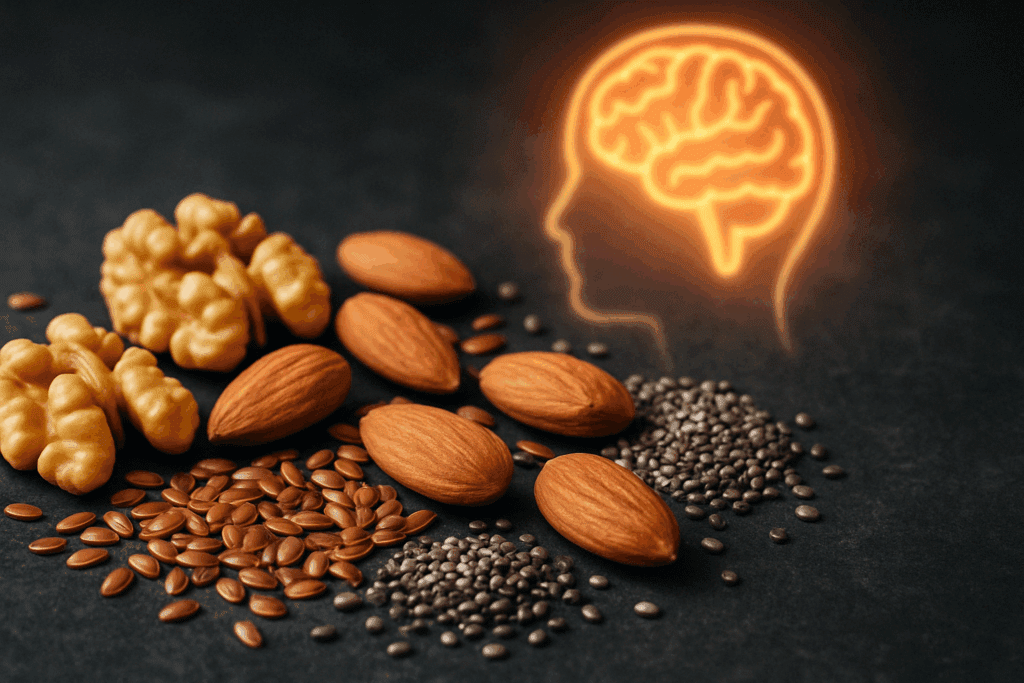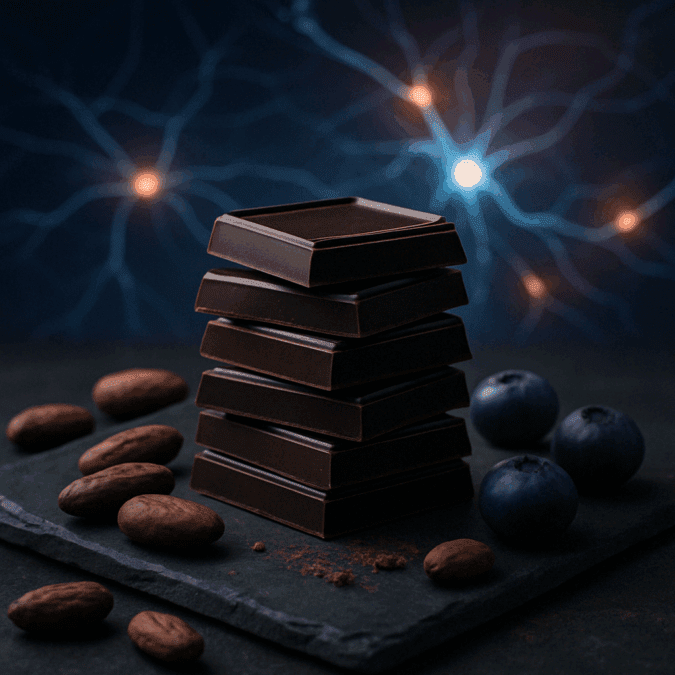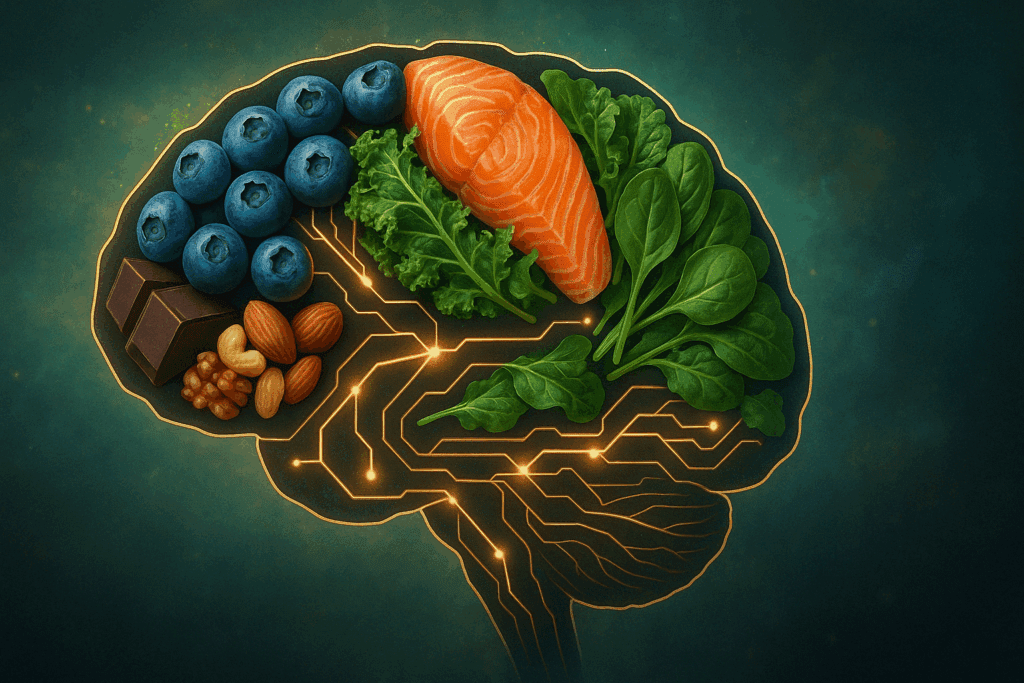Introduction: Exploring the Link Between Nutrition and Cognitive Vitality
In today’s fast-paced and cognitively demanding world, maintaining brain health has never been more important. More people are asking what foods are good for preserving memory, enhancing focus, and fostering long-term cognitive resilience. Scientists have long established that nutrition plays a central role in brain function, and the right dietary choices can help sharpen the mind, boost mental clarity, and even stave off neurodegenerative diseases. However, determining what food is best for cognitive clarity requires a careful analysis of nutrients, research-backed benefits, and real-world applicability.
You may also like: Where to Buy Bacopa Monnieri: How to Find Quality Supplements for Cognitive and Memory Support
This comprehensive guide will explore the top five foods that may naturally support brain health, cognitive sharpness, and mental endurance. Beyond listing popular items, we will delve into the mechanisms by which these foods exert their effects, examine supporting scientific studies, and provide practical tips for incorporating them into your diet. When considering what food helps sustain intellectual performance over time, these selections emerge as some of the most compelling and well-supported by the latest evidence.

Blueberries: The Antioxidant Powerhouse for Mental Sharpness
When evaluating what foods are good for enhancing brain function, blueberries consistently rank at the top of the list. Often dubbed a “superfood,” blueberries are particularly rich in flavonoids, a group of plant compounds known for their potent antioxidant and anti-inflammatory properties. Inflammation and oxidative stress are two of the leading contributors to cognitive decline, and the bioactive compounds in blueberries may combat these damaging processes.
Research from the University of Reading and the Peninsula Medical School suggests that regular blueberry consumption can improve memory and cognitive performance in both children and older adults. These findings are not merely correlative; mechanistic studies have shown that flavonoids in blueberries can cross the blood-brain barrier and accumulate in regions associated with learning and memory, such as the hippocampus. This cellular interaction helps to explain why blueberries are often recommended when asking what food helps sustain long-term mental sharpness.
In addition to cognitive benefits, blueberries also support vascular health, improving blood flow to the brain—a crucial factor for optimal cognitive function. Consuming a daily serving of blueberries, whether fresh, frozen, or blended into a smoothie, is a delicious and evidence-based way to fortify brain health. Among the top five foods that confer comprehensive cognitive benefits, blueberries stand out for their rich nutrient profile and versatility.

Fatty Fish: Omega-3 Fatty Acids and the Brain’s Building Blocks
Another compelling candidate when discussing what foods are good for the brain is fatty fish, particularly varieties like salmon, mackerel, sardines, and trout. These fish are rich in omega-3 fatty acids, primarily EPA (eicosapentaenoic acid) and DHA (docosahexaenoic acid), which are integral components of neuronal cell membranes.
Omega-3 fatty acids are essential for maintaining the structure and function of brain cells, facilitating communication between neurons, and regulating neurotransmitter pathways. A deficiency in omega-3s has been associated with cognitive impairments, mood disorders, and even increased risk of neurodegenerative diseases such as Alzheimer’s.
Clinical trials, including those published in “Neurology” and “The American Journal of Clinical Nutrition,” have demonstrated that omega-3 supplementation can enhance memory, attention span, and executive function, particularly in older adults experiencing mild cognitive decline. Thus, when considering what food is best for preserving and enhancing cognitive faculties, fatty fish emerges as a powerful ally.
Incorporating two to three servings of fatty fish per week can significantly bolster brain health. For individuals seeking plant-based alternatives, options such as algae oil supplements can provide DHA in a vegan-friendly format. Nevertheless, in the hierarchy of top five foods for cognitive clarity, fatty fish occupies a well-earned position thanks to its critical role in brain physiology.
Leafy Green Vegetables: The Brain’s Natural Multivitamin
Among the answers to what foods are good for maintaining cognitive health, leafy greens such as spinach, kale, and Swiss chard offer unparalleled benefits. These vegetables are densely packed with vitamins, minerals, and phytonutrients that nourish the brain on multiple levels.
Notably, leafy greens are high in vitamin K, lutein, folate, and beta carotene. Each of these compounds plays a unique role in brain function: vitamin K supports sphingolipid metabolism (essential for brain cell structure), lutein acts as an antioxidant, and folate facilitates neurotransmitter synthesis by aiding in homocysteine metabolism. Elevated homocysteine levels have been linked to cognitive dysfunction and dementia, making folate an indispensable nutrient for those concerned about what food helps prevent mental decline.
A 2018 study from Rush University Medical Center found that individuals who consumed one to two servings of leafy greens daily had the cognitive abilities of people 11 years younger than those who rarely or never consumed these vegetables. This dramatic finding underscores why leafy greens are considered one of the top five foods for brain health.
The versatility of leafy greens allows them to be easily incorporated into meals—whether in salads, sautéed as a side dish, or blended into nutrient-dense smoothies. Prioritizing leafy greens in your diet represents a proactive and scientifically validated strategy for fostering cognitive longevity.

Nuts and Seeds: Small Packages, Big Brain Benefits
When exploring what food is best for sustained mental performance, nuts and seeds emerge as nutritional powerhouses packed with brain-supportive compounds. Varieties such as walnuts, almonds, flaxseeds, and chia seeds offer a diverse array of omega-3 fatty acids, antioxidants, and essential vitamins and minerals.
Walnuts, in particular, have been extensively studied for their brain health benefits. Rich in alpha-linolenic acid (ALA), a plant-based omega-3 fatty acid, walnuts support neuronal integrity and enhance neurotransmitter signaling. Studies published in the “Journal of Nutrition, Health & Aging” have linked higher walnut consumption with better cognitive test scores among older adults.
Similarly, seeds like flaxseeds and chia seeds contribute valuable fiber, magnesium, and plant-based omega-3s. These nutrients collectively aid in maintaining stable blood sugar levels, reducing inflammation, and supporting cerebral blood flow—all critical factors when evaluating what food helps preserve and enhance mental clarity.
Adding a handful of nuts or a tablespoon of seeds to your daily diet is an accessible way to obtain these benefits. Whether sprinkled over oatmeal, blended into smoothies, or simply eaten as a snack, nuts and seeds deserve their place among the top five foods that fortify cognitive well-being naturally.
Dark Chocolate: A Delicious Boost for Cognitive Performance
Dark chocolate, particularly varieties containing at least 70% cacao, is a delightful yet potent addition to the discussion of what foods are good for brain health. Unlike sugary milk chocolates, dark chocolate is rich in flavonoids, especially epicatechin, which has been shown to improve various aspects of cognitive function.
Studies in the “Journal of Psychopharmacology” report that acute consumption of dark chocolate can enhance verbal memory and reaction time. Additionally, dark chocolate consumption stimulates the production of nitric oxide, which relaxes blood vessels, improves blood flow, and consequently boosts oxygen delivery to the brain.
For individuals wondering what food is best for combining pleasure and performance, dark chocolate offers a rare confluence of taste and utility. Its antioxidant profile helps combat oxidative stress, while its modest caffeine content provides a gentle energy boost without the crash associated with other stimulants.
Incorporating a small serving of high-quality dark chocolate into your daily or weekly routine can be both an indulgent and scientifically justified choice. As one of the top five foods for natural cognitive support, dark chocolate exemplifies how health-promoting foods can also delight the senses.
The Interplay Between Diet and Cognitive Longevity
Understanding what foods are good for cognitive longevity involves appreciating the complex interplay between nutrients, cellular health, and vascular function. Each of the top five foods discussed—blueberries, fatty fish, leafy greens, nuts and seeds, and dark chocolate—supports brain health through multiple, often synergistic mechanisms.
Moreover, it’s important to recognize that no single food can serve as a magic bullet. Rather, cognitive resilience is built over time through consistent, holistic dietary patterns. The Mediterranean diet, for instance, which emphasizes fruits, vegetables, whole grains, healthy fats, and lean proteins, has been repeatedly associated with better cognitive outcomes. Therefore, incorporating these top five foods into a balanced and varied diet remains the most effective strategy for promoting lifelong mental acuity.
When evaluating what food helps to support brain health, it is also crucial to avoid detrimental dietary patterns. High intake of refined sugars, trans fats, and ultra-processed foods has been linked to impaired cognitive function and increased risk of dementia. Thus, the journey toward optimal brain health involves not just choosing the right foods but also consciously limiting those that cause harm.

Frequently Asked Questions: Top Five Foods That May Support Brain Health and Cognitive Clarity Naturally
1. Can brain-boosting foods really influence mental performance in high-stress environments?
Absolutely. In high-stress environments, the brain requires more antioxidants and nutrients to counteract the damaging effects of cortisol and oxidative stress. Understanding what foods are good for stress resilience can empower individuals to optimize cognitive performance even under pressure. For instance, foods rich in polyphenols like blueberries and dark chocolate can help maintain executive function during mental strain. When evaluating what food helps sustain peak performance in demanding situations, it’s clear that strategic dietary choices can create a tangible cognitive edge. Incorporating the top five foods into daily routines is an actionable strategy for long-term mental endurance.
2. How does the gut-brain axis influence the effectiveness of brain-healthy foods?
Emerging research shows that the gut-brain axis—a bidirectional communication system between the gastrointestinal tract and the brain—plays a crucial role in cognitive health. When asking what foods are good for brain function, it’s important to remember that foods high in fiber and prebiotics, such as leafy greens and nuts, also support gut microbiota diversity. This, in turn, enhances the production of neurotransmitters like serotonin, which influence mood and cognition. Thus, what food helps the gut often helps the brain simultaneously, creating a synergistic relationship that amplifies the benefits of a brain-healthy diet. Prioritizing gut-friendly foods alongside the top five foods can significantly enhance overall cognitive outcomes.
3. Are there specific preparation methods that maximize the brain benefits of these foods?
Yes, preparation methods can greatly influence the bioavailability of critical nutrients. For example, steaming leafy greens preserves folate and vitamin K better than boiling, which can leach water-soluble nutrients. When considering what food is best prepared for cognitive benefits, raw consumption of nuts and minimal processing of blueberries retain the highest levels of beneficial compounds. Moreover, lightly grilling fatty fish instead of deep-frying helps maintain the integrity of omega-3 fatty acids. To get the most out of the top five foods, adopting gentle cooking techniques and mindful preparation is key to unlocking their full neuroprotective potential.
4. How can one strategically combine foods for amplified brain benefits?
Combining complementary foods can create a synergistic effect that amplifies brain health benefits. For example, pairing dark chocolate with a handful of walnuts not only satisfies a sweet craving but also provides a powerful combination of flavonoids and omega-3s. Understanding what foods are good for multitargeted support allows for smarter meal planning that enhances cognitive resilience. When considering what food helps amplify memory and focus, combining berries with a leafy green salad dressed in olive oil offers antioxidants and healthy fats in a single meal. Thoughtfully layering the top five foods within meals can exponentially increase their cognitive impact.
5. Can these foods benefit cognitive health across different life stages?
Definitely. While the top five foods are often highlighted for aging populations, they offer benefits at every life stage. For children and young adults, the right nutrients foster neurodevelopment, attention span, and learning efficiency. Adults seeking career longevity and stress resilience can also leverage what foods are good for maintaining focus and creativity. Meanwhile, in later years, strategic consumption of these foods may delay cognitive decline and preserve memory function. Understanding what food is best suited for each developmental stage allows for tailored approaches to brain health throughout the human lifespan.
6. How soon can someone expect noticeable cognitive improvements after adjusting their diet?
Results vary depending on individual metabolic health, baseline diet, and the extent of dietary changes. Some individuals may experience improved mental clarity and mood within a few weeks of consistently consuming what foods are good for brain function. However, for more pronounced effects, especially regarding memory enhancement or long-term cognitive protection, a commitment of several months is often necessary. When examining what food helps expedite cognitive improvements, those rich in polyphenols and omega-3s, like fatty fish and berries, show the most rapid preliminary benefits. Long-term integration of the top five foods is the most reliable path to sustained mental vitality.
7. Can incorporating these foods replace the need for nootropic supplements?
While nootropic supplements can complement a cognitive health regimen, they should not replace a nutrient-dense diet. Real foods offer a matrix of nutrients that work together in ways supplements cannot replicate. Understanding what foods are good for foundational brain health highlights the importance of prioritizing whole foods over isolated compounds. When asking what food is best for supporting natural neuroplasticity and neurotransmitter function, the top five foods offer unparalleled advantages. Supplements can be useful when dietary intake is inadequate, but they should always be viewed as secondary to a well-rounded, brain-focused diet.
8. How do social and cultural factors influence access to brain-healthy foods?
Accessibility to nutrient-rich foods can vary dramatically depending on geographic location, socioeconomic status, and cultural traditions. In some regions, what foods are good for cognitive health may be less available due to food deserts or economic barriers. Cultural dietary patterns, however, often naturally emphasize what food helps sustain brain health, such as Mediterranean diets rich in leafy greens and seafood. Global initiatives aimed at improving access to the top five foods are critical for addressing disparities in cognitive aging and mental well-being across populations. Understanding and respecting these cultural and social factors is essential for creating equitable strategies to promote brain health worldwide.
9. Are there any risks associated with overconsumption of these foods?
Even beneficial foods must be consumed in balance. For example, excessive intake of fatty fish can lead to mercury accumulation, while overindulging in dark chocolate may contribute to high caloric intake and blood sugar spikes. It is important to recognize that while asking what food is best for brain health, moderation remains a guiding principle. The top five foods are safe for most individuals when incorporated thoughtfully into a varied diet. Consulting with a healthcare professional ensures that personal health conditions, such as allergies or metabolic concerns, are taken into account when designing a brain-optimized eating plan.
10. What emerging research might influence future recommendations for brain-healthy eating?
Ongoing studies are exploring novel bioactive compounds in foods such as pomegranates, turmeric, and even seaweed that show promise for brain health. Scientists are continually refining our understanding of what foods are good for neurogenesis, synaptic plasticity, and inflammation regulation. Personalized nutrition, driven by genetic profiling and microbiome analysis, may soon allow us to determine precisely what food helps optimize each individual’s cognitive blueprint. As research evolves, the foundation laid by the top five foods remains crucial, but future dietary guidelines may become increasingly customized. Staying informed on these developments can empower proactive, science-driven approaches to cognitive longevity.

Conclusion: Nourishing the Mind Through Intentional Food Choices
The quest to determine what foods are good for supporting brain health and cognitive clarity is more than an academic exercise; it is a practical, actionable endeavor that can profoundly impact quality of life. The top five foods identified—blueberries, fatty fish, leafy greens, nuts and seeds, and dark chocolate—represent a synthesis of the best available scientific evidence and real-world practicality.
Incorporating these foods into your daily regimen not only supplies the brain with essential nutrients but also fosters a dietary environment conducive to neurogenesis, synaptic plasticity, and vascular integrity. When considering what food is best for enhancing cognitive performance naturally, these selections offer a compelling and delicious foundation.
Ultimately, the question of what food helps preserve and enhance brain function invites ongoing curiosity and commitment. As scientific research continues to unravel the intricate connections between nutrition and cognition, one truth remains clear: investing in dietary choices today can yield profound dividends in mental clarity, resilience, and vitality tomorrow.
By embracing a thoughtful, evidence-based approach to nutrition—one that prioritizes the top five foods shown to benefit the brain—we empower ourselves to thrive cognitively, creatively, and emotionally throughout every stage of life.
Was this article helpful? Don’t let it stop with you. Share it right now with someone who needs to see it—whether it’s a friend, a colleague, or your whole network. And if staying ahead on this topic matters to you, subscribe to this publication for the most up-to-date information. You’ll get the latest insights delivered straight to you—no searching, no missing out.
Further Reading:
Best Foods for A Healthy Brain and Improved Memory
10 foods to boost your brainpower
Brain boost: Top 5 foods for cognitive health
Important Note: The information contained in this article is for general informational purposes only, and should not be construed as health or medical advice, nor is it intended to diagnose, prevent, treat, or cure any disease or health condition. Before embarking on any diet, fitness regimen, or program of nutritional supplementation, it is advisable to consult your healthcare professional in order to determine its safety and probable efficacy in terms of your individual state of health.
Regarding Nutritional Supplements Or Other Non-Prescription Health Products: If any nutritional supplements or other non-prescription health products are mentioned in the foregoing article, any claims or statements made about them have not been evaluated by the U.S. Food and Drug Administration, and such nutritional supplements or other health products are not intended to diagnose, treat, cure, or prevent any disease.


